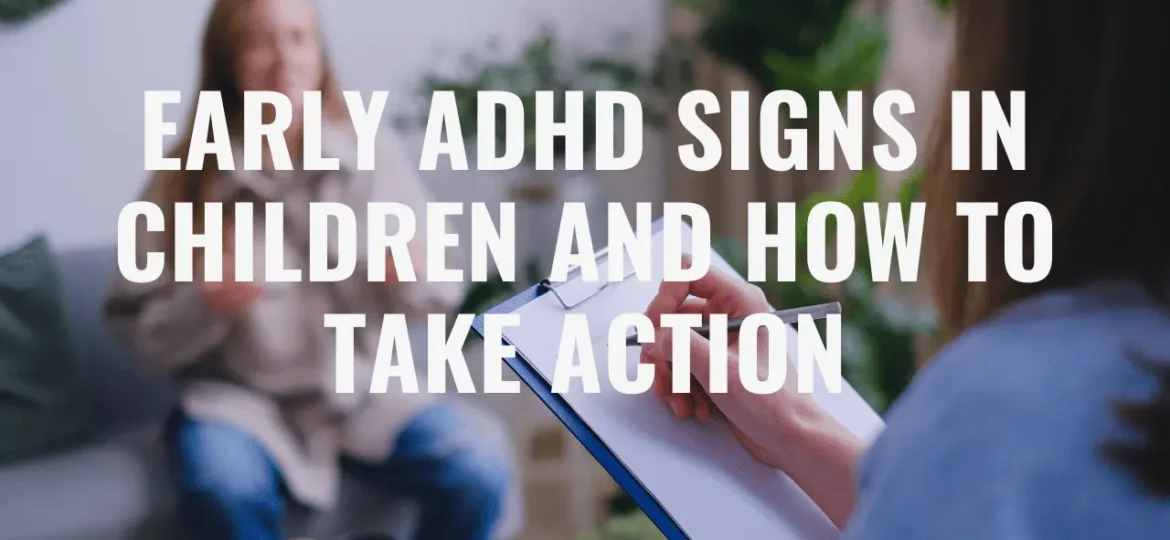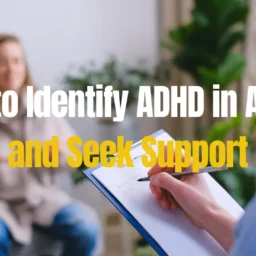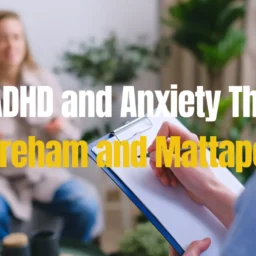
ADHD, or attention deficit hyperactivity disorder, is a common neurodevelopmental disorder in children today. Symptoms like inattention, hyperactivity, and impulsivity can greatly affect a child’s social, academic, and emotional growth. The key to ensuring children with ADHD thrive is early diagnosis, proper treatment, and ongoing support. If you’re a parent or caregiver in Dartmouth or nearby areas like New Bedford, Wareham, or Freetown, look for early signs and get help from local experts. This article will explore the early signs of ADHD in children, the role of a child psychiatrist, and treatment options available in these local communities.
Understanding ADHD in Children
ADHD in children is often marked by persistent patterns of inattention, hyperactivity, and impulsive behaviors. These behaviors can interfere with a child’s ability to focus, complete tasks, and follow social norms. When left unaddressed, ADHD can negatively affect a child’s academic performance, behavior in social settings, and even family dynamics.
Common Symptoms of ADHD in Children
Children with ADHD often show one or more of the following symptoms, though the presentation can vary widely between children. It’s important for parents to be aware of these behaviors:
- Inattention: Difficulty staying focused on tasks, forgetting instructions, and making careless mistakes in schoolwork or daily activities.
- Hyperactivity: Restlessness, excessive talking, and difficulty staying seated during activities such as meals or school lessons.
- Impulsivity: Interrupting others, difficulty waiting for their turn, or acting without thinking about the consequences.
In Dartmouth and surrounding areas, local professionals such as pediatricians and child psychologists can help identify these signs early. These behaviors need to happen regularly over time and in different places, like home, school, and activities, to be seen as possible ADHD.
How ADHD Affects a Child’s Development
ADHD doesn’t just affect a child’s ability to focus in class; it can influence emotional, social, and cognitive development. Kids with ADHD often have trouble controlling impulses. This can cause problems with friends, disruptive behavior in school, and difficulty managing emotions. This can often result in lower self-esteem, frustration, or anxiety, particularly when children are unable to meet academic or social expectations.
Untreated ADHD can cause big problems in adulthood. These include issues like underperforming at work and having ongoing relationship struggles. However, with the right support and treatment, children with ADHD can develop the skills necessary to manage their symptoms and excel in various areas of their lives.
Identifying Early Signs of ADHD in Dartmouth and Surrounding Areas
In communities like Dartmouth, New Bedford, Wareham, and Westport, identifying the early signs of ADHD can be a game-changer for children. Local pediatricians, child psychologists, and mental health experts assess children for ADHD. Early intervention allows families to start the process of obtaining a diagnosis and exploring treatment options that best suit their child’s needs.
ADHD Diagnosis in Children
To diagnose ADHD, a trained professional, like a pediatrician or child psychiatrist, must conduct a thorough evaluation. The process involves gathering a comprehensive history of the child’s behavior, input from parents and teachers, and standardized assessments.
How to Get an Accurate ADHD Diagnosis
If you suspect your child may have ADHD, the first step is to schedule an appointment with a pediatrician in your area. Pediatricians in Dartmouth, Acushnet, and Marion can do initial screenings. They can also refer you to specialists for a detailed evaluation. The diagnostic process usually includes:
- Parent and Teacher Input: Parents and teachers will be asked to complete questionnaires about the child’s behavior across different settings.
- Behavioral Observations: Trained professionals may observe the child in a structured setting, such as a classroom or during playtime, to assess behaviors such as impulsivity, attention, and social interactions.
- Standardized Rating Scales: These scales are used to evaluate the child’s behaviors compared to peers of the same age.
An accurate diagnosis is key. It helps the child get the right treatment. This can mean therapy, medication, or behavioral interventions.
The Role of a Child Psychiatrist in ADHD Diagnosis
Child psychiatrists are specialists who focus on diagnosing and treating mental health conditions in children, including ADHD. They are crucial in providing a comprehensive evaluation to determine whether ADHD is the cause of the child’s behaviors. Child psychiatrists in Dartmouth, New Bedford, and nearby areas team up with parents and schools. They collect detailed information about a child’s behavior patterns. Child psychiatrists use their skills to make sure ADHD is diagnosed correctly. They also identify and treat other conditions, like anxiety or depression.
ADHD Diagnosis Services in Dartmouth, and Nearby Locations
Dartmouth and nearby towns, such as Westport, Fairhaven, and Freetown, have many skilled professionals who provide ADHD diagnostic services. Pediatricians and child psychiatrists in these areas help families with the diagnosis process. They make sure children get a quick and correct diagnosis. By reaching out to local clinics or community health centers, families can access essential ADHD services in their area.
Effective ADHD Treatment for Kids
While there is no single solution for ADHD, a comprehensive treatment plan can help children manage their symptoms and succeed in various aspects of their lives. In Dartmouth, New Bedford, Wareham, and surrounding areas, there are several treatment options available for children with ADHD.
Medications and Therapies for ADHD
Medication is commonly given to children with ADHD. This is true for those who struggle to focus and manage their impulses. Stimulant meds like Ritalin and Adderall are often prescribed. They help kids manage ADHD symptoms effectively. However, non-stimulant medications are also available for children who do not respond well to stimulants.
In addition to medication, therapy is an essential part of managing ADHD. Cognitive Behavioral Therapy (CBT) helps kids tackle negative thoughts. It teaches coping skills and boosts social abilities. Behavioral therapy is key in helping children change their behavior. It uses structured reinforcement techniques to teach them how to do this.
Behavioral Strategies for Managing ADHD
While medications and therapy are critical, parents and teachers can also play a crucial role in managing ADHD symptoms. Behavioral strategies are often incorporated into the daily routines of children with ADHD to help them remain focused and regulate their impulses. These strategies include:
- Creating Structured Routines: Children with ADHD thrive in structured environments. Having a consistent daily routine, with specific times for tasks such as homework, meals, and playtime, can help them stay on track.
- Using Visual Reminders and Checklists: These tools can help children remember what tasks need to be completed and provide them with a sense of accomplishment once the tasks are finished.
- Reinforcing Positive Behavior: Rewarding children for good behavior, such as staying focused or following instructions, helps reinforce these behaviors and encourages children to continue to improve.
These strategies can be especially helpful in school settings. Schools in Dartmouth, Wareham, and Westport team up with families. They use behavioral strategies to help kids succeed in school.
Finding ADHD Treatment for Children in Dartmouth and the South Coast Area
Families in Dartmouth, New Bedford, and surrounding towns have access to a wide range of treatment options for children with ADHD. Parents can find ADHD experts nearby. This includes local pediatricians, child psychiatrists, and therapy centers in Fairhaven, Mattapoisett, and Westport. Local schools and community groups provide programs to help kids with ADHD. These programs focus on skills needed for success in school and social situations.
Importance of Child Mental Health in ADHD Treatment
ADHD is not just a behavioral disorder; it can also have significant emotional and mental health implications. Children with ADHD are at a higher risk for developing other mental health conditions, including anxiety, depression, and learning difficulties. It’s essential to consider the overall mental health of the child alongside ADHD treatment to ensure a comprehensive approach to their well-being.
The Link Between ADHD and Child Mental Health
The struggles associated with ADHD—such as difficulty with focus, impulsivity, and emotional regulation—can take a toll on a child’s mental health. Many children with ADHD experience feelings of frustration, low self-esteem, and even anxiety. It’s important for parents to address these mental health concerns alongside ADHD treatment.
How to Support Your Child’s Mental Health During ADHD Treatment
Supporting a child’s mental health is crucial for their overall success. Open communication, emotional support, and a positive home can help kids with ADHD. These factors make it easier for them to manage symptoms and handle emotional challenges. If your child struggles with mental health, a therapist or counselor in Dartmouth or Westport can help. They provide tools to manage emotions and boost well-being.
Mental Health Resources in Dartmouth, and Other Local Communities
There are numerous mental health resources available in Dartmouth, New Bedford, and surrounding areas. Many clinics and therapists focus on child mental health. They can help kids with ADHD deal with emotional or psychological challenges. Families in Freetown, Acushnet, and Marion can access local mental health centers to provide comprehensive care for children with ADHD.
Local Resources for ADHD Support in Dartmouth and Surrounding Areas
Families living in Dartmouth, New Bedford, and surrounding communities have access to various resources for ADHD support. Local healthcare providers, mental health experts, and schools work together to provide a complete approach to ADHD treatment. If you need a child psychiatrist, a behavioral therapist, or educational support, many resources can help children with ADHD thrive.
Conclusion
ADHD is a complex condition that requires a comprehensive, individualized approach to treatment. Early intervention, accurate diagnosis, and ongoing support can help children with ADHD reach their full potential. Families in Dartmouth, New Bedford, Wareham, Freetown, Westport, Acushnet, Fairhaven, Mattapoisett, Marion, and Rochester can get help. Local healthcare providers and mental health experts are here to help you understand and manage ADHD. Acting early can greatly boost your child’s academic, social, and emotional health. This helps them become confident and successful as they grow.



